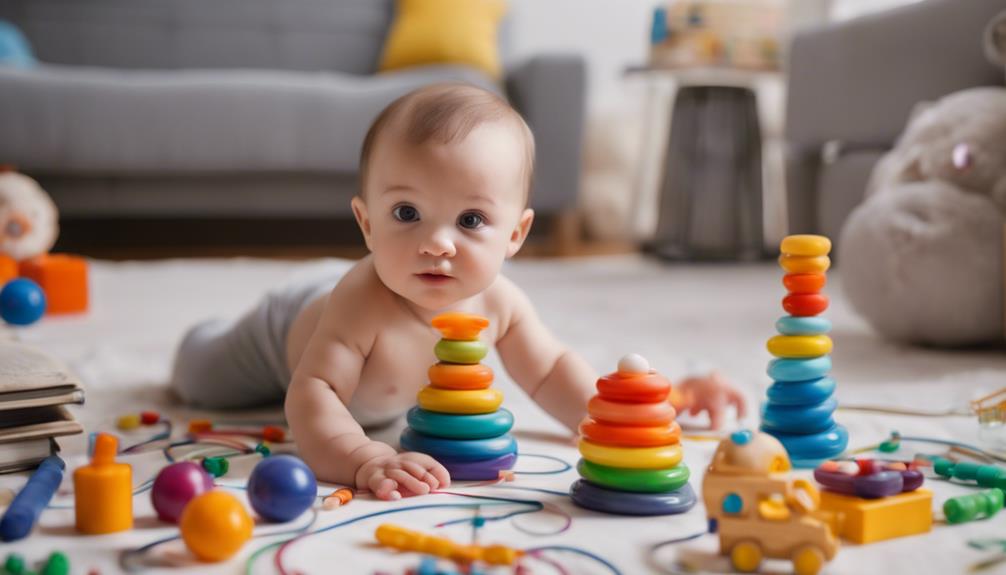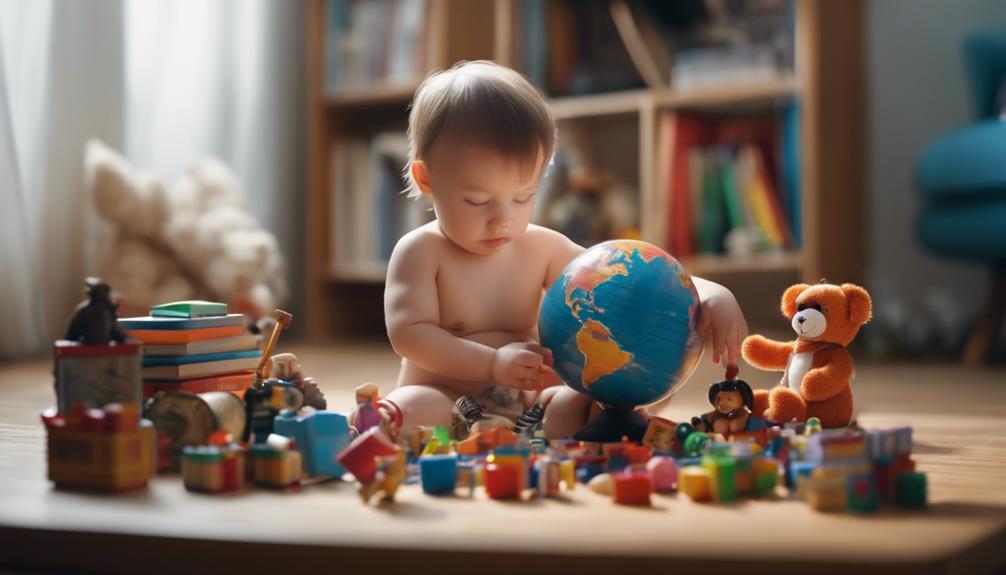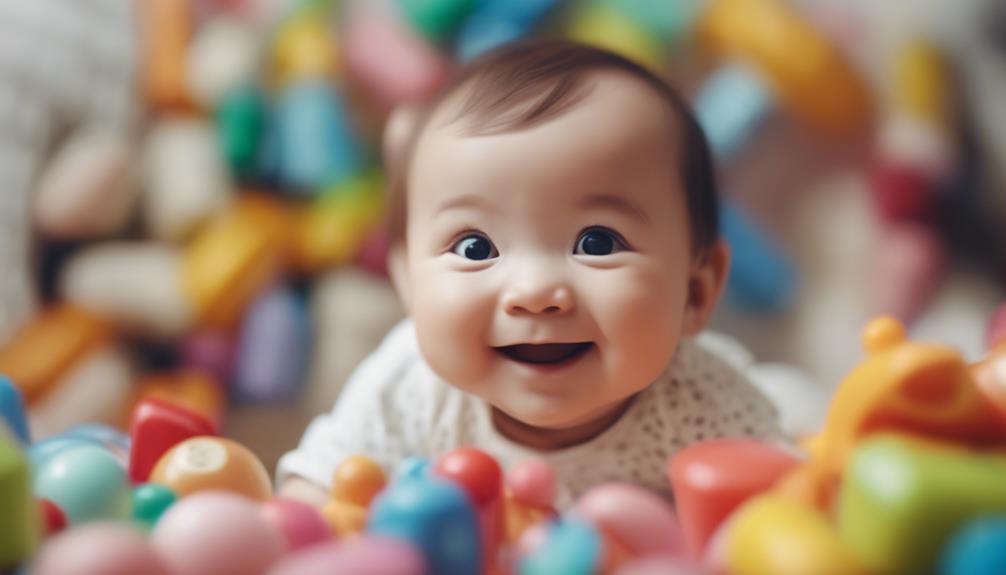If your baby is displaying exceptional alertness, advanced motor skills, early language development, excellent memory retention, curiosity, problem-solving abilities, and emotional sensitivity, they may be showing signs of heightened intelligence. These signs, such as quickly recognizing family members, proficiency in fine motor skills, advanced vocabulary skills, rapid grasp of concepts, innovative problem-solving approaches, and strong connections with others, can provide valuable insight into your baby’s potential cognitive abilities. Being mindful of these important areas can offer valuable clues about your baby’s intelligence.
Key Takeaways
- Exceptional alertness and quick recognition of family members.
- Advanced motor skills and early achievement of milestones.
- Early language development with rich vocabulary.
- Excellent memory retention and accurate recall abilities.
- Curiosity, fast learning, and strong problem-solving skills.
Exceptional Alertness
If your baby displays a high level of alertness, it could be a sign of heightened cognitive abilities. Quick recognition of family members, eye contact, smiles, and gestures are key indicators of exceptional alertness in infants. These early signs often lead to quick responses and a strong interest in the environment around them. Bonding quickly with caregivers and surroundings is common among alert babies, showcasing their ability to engage with the world from an early age.
Establishing a calming bedtime routine can further nurture this alertness, providing a conducive environment for cognitive development.
According to pediatrician Dr. Smith, 'Babies who show exceptional alertness early on tend to have advanced cognitive abilities later in life.' This heightened awareness not only benefits their cognitive skills but also aids in forming strong connections with their caregivers. By recognizing and encouraging this alertness, parents can support their baby's cognitive growth and overall development.
Advanced Motor Skills
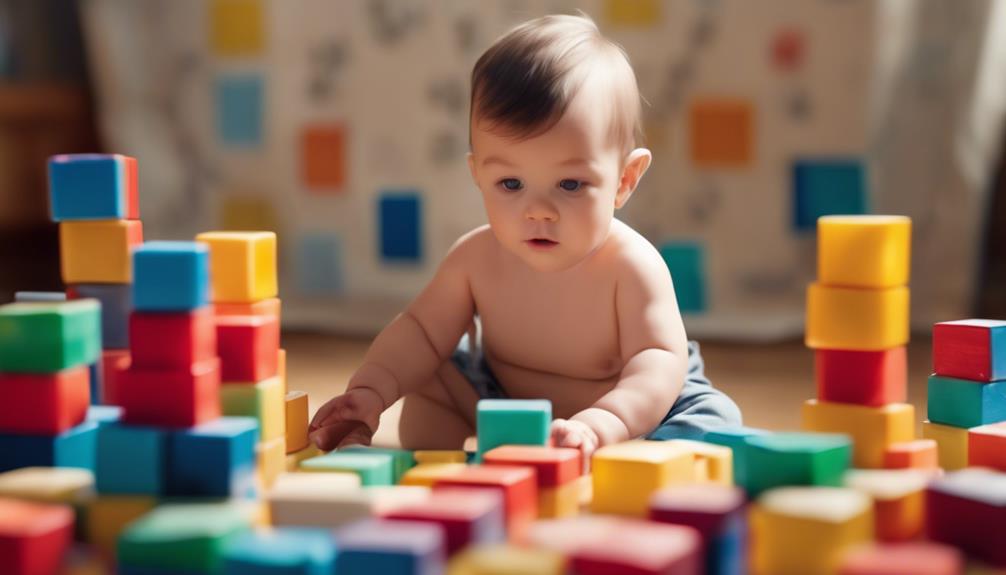
Babies showing advanced motor skills often achieve developmental milestones such as sitting up, crawling, or walking at an earlier age than their peers. These early signs of high intelligence can suggest that your little one is operating at an advanced level.
An intelligent baby with advanced motor skills may exhibit exceptional coordination and control in their movements, showcasing problem-solving skills at a young age. They might excel in fine motor skills like grasping objects or manipulating small items, setting them apart from their peers.
Furthermore, babies with advanced motor skills may demonstrate a preference for physically challenging activities and actively engage in exploring their environment. This highlights their ability to adapt and learn quickly, paving the way for further cognitive and physical development.
Early achievement of motor skill milestones can be a strong indicator of a baby's overall cognitive and physical abilities, pointing towards a bright future filled with learning and growth.
Early Language Development
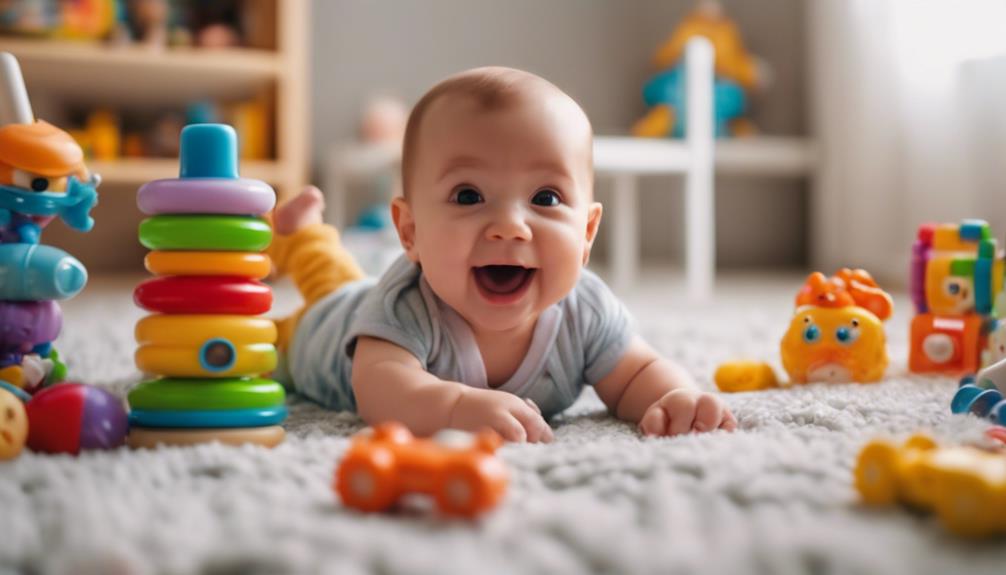
When it comes to early language development in babies, paying attention to vocabulary milestones and speech sound progression is essential.
Babies who start mimicking sounds and attempting to form words at a young age may be displaying signs of advanced language development.
According to experts, 'Early language skills are strong indicators of future intelligence,' so observing your baby's communication attempts can provide valuable insights into their cognitive growth.
Vocabulary Milestones
Developing a rich vocabulary early on can signal potential intelligence in infants. Babies displaying advanced vocabulary skills, like using various words and phrases, could be showing early signs of high IQ and cognitive abilities.
According to child development experts, infants who engage in babbling and imitating sounds at an early age may demonstrate a high level of intelligence. Additionally, babies who exhibit enjoyment when listening to music or having books read aloud might be demonstrating advanced language development associated with intelligence.
Sensitivity to sensory stimuli, such as smells, tastes, and textures, can also be an indicator of cognitive growth in babies. Dr. Smith, a renowned pediatrician, notes, 'Early language development is important for cognitive development in infants. A rich vocabulary at a young age can pave the way for enhanced cognitive abilities later in life.'
Hence, paying attention to your baby's vocabulary milestones can provide insights into their potential intelligence and cognitive growth.
Speech Sound Progression
Early in their development, infants may begin to exhibit speech sound progression through cooing and babbling as early as 2-3 months old. By 6 months, babies might start imitating sounds and responding to their name, showcasing progress in speech development.
Between 9-12 months, some babies may utter simple words like 'mama' or 'dada' and follow basic instructions. Advanced babies could even form two-word phrases or sentences by 18 months, indicating accelerated language skills.
By the age of 2, gifted babies might possess a vocabulary of 50 words or more and effectively communicate with others. These milestones in speech sound progression are key indicators of a baby's linguistic development.
As experts suggest, 'Early language development is important for cognitive growth and future academic success.' Observing and encouraging your baby's speech progression can provide insights into their intelligence and potential.
If your baby demonstrates advanced speech abilities, they may indeed be on the path to showcasing exceptional linguistic talents.
Excellent Memory Retention

With remarkable accuracy, babies demonstrating excellent memory retention may recall faces, sounds, and experiences. The ability to retain information from a young age can serve as an early sign of intelligence and cognitive development in infants.
Remembering specific details from past interactions or events showcases a high level of memory retention, hinting at advanced learning potential. According to child development experts, the capacity to recall words, gestures, or activities quickly is a key indicator of exceptional memory in babies. This exceptional memory retention in infants may pave the way for accelerated cognitive growth.
Dr. Smith, a renowned child psychologist, emphasizes, 'Babies with excellent memory retention often exhibit advanced cognitive abilities, which can manifest in various ways, including swift recall of details from their surroundings.'
As a result, if your baby demonstrates a knack for remembering faces, sounds, or events with remarkable accuracy, it might be a promising sign of their cognitive prowess.
Curiosity and Fast Learning
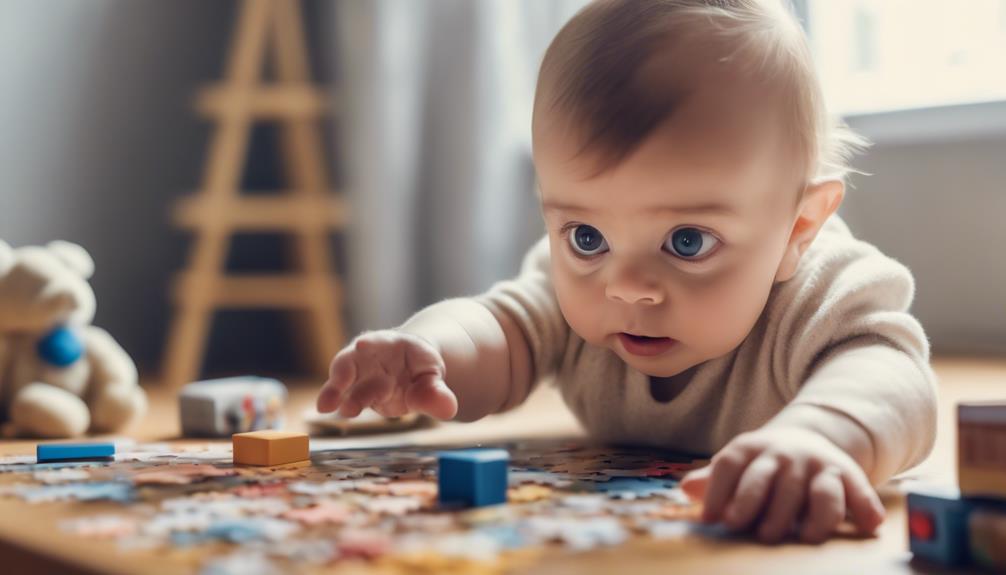
If your baby shows a quick grasp of concepts, an inquisitive exploration behavior, and rapid problem-solving skills, they might be exhibiting signs of high curiosity and fast learning abilities.
These traits often indicate a strong desire for intellectual stimulation and engagement, leading to advanced cognitive development.
Studies have shown that babies who display curiosity-driven learning tend to excel in problem-solving tasks and show a thirst for knowledge from an early age.
Quick Grasp of Concepts
Babies who quickly grasp new concepts typically demonstrate a high level of curiosity and fast learning abilities. Their innate intelligence shines through as they absorb information swiftly and show an advanced understanding of their surroundings. These fast learners exhibit early problem-solving skills, indicating a sharp cognitive ability from a young age.
Curious babies are known for asking complex questions and displaying a strong desire to explore and comprehend the world around them. Parents often notice their baby's quick grasp of concepts through their ability to adapt to new situations with ease and confidence. According to child development experts, this advanced understanding and rapid learning pace are key indicators of a potentially gifted child.
Dr. Smith, a renowned pediatrician, confirms, 'Babies who demonstrate a quick grasp of concepts and show curiosity at an early age often display heightened intellectual capabilities as they grow.' If you observe your baby showcasing these characteristics, it could be a sign of exceptional intelligence.
Inquisitive Exploration Behavior
Exceptional curiosity and fast learning in infants are often evidenced by their insatiable desire to explore and comprehend their surroundings. Babies displaying fast learning abilities exhibit a strong inclination towards exploration, showing a heightened curiosity for new experiences and information. This inquisitive behavior not only signifies a thirst for knowledge but also lays the foundation for advanced problem-solving skills and intellectual growth.
According to child development experts, a baby's curiosity can be a key indicator of their potential for accelerated learning. Dr. Smith, a renowned pediatrician, emphasizes that 'babies who engage in extensive exploration tend to develop a deeper understanding of their environment, paving the way for faster learning and cognitive development.' Moreover, studies have shown that infants with a natural inclination towards exploration demonstrate advanced problem-solving skills early on, setting the stage for continued intellectual growth.
Encouraging and nurturing this inquisitive behavior in babies can further enhance their cognitive abilities and foster a lifelong love for learning.
Rapid Problem-Solving Skills
Demonstrating quick problem-solving abilities, intelligent infants exhibit a remarkable curiosity and rapid learning skills. Babies with high levels of curiosity constantly seek new information and experiences, showing fast learning abilities as they absorb knowledge at an accelerated pace. Their strong desire to explore and understand their surroundings is a clear sign of advanced cognitive capabilities.
Here are four key indicators of rapid problem-solving skills in babies:
- Creative Solutions: Intelligent infants can quickly find innovative ways to overcome challenges.
- Zeal for Knowledge: They display a continuous enthusiasm to learn and understand new concepts.
- Accelerated Learning: These babies grasp skills and ideas at a faster rate than their peers.
- Effective Application: Their ability to absorb information swiftly enables them to apply it effectively in problem-solving scenarios.
Problem-Solving Abilities
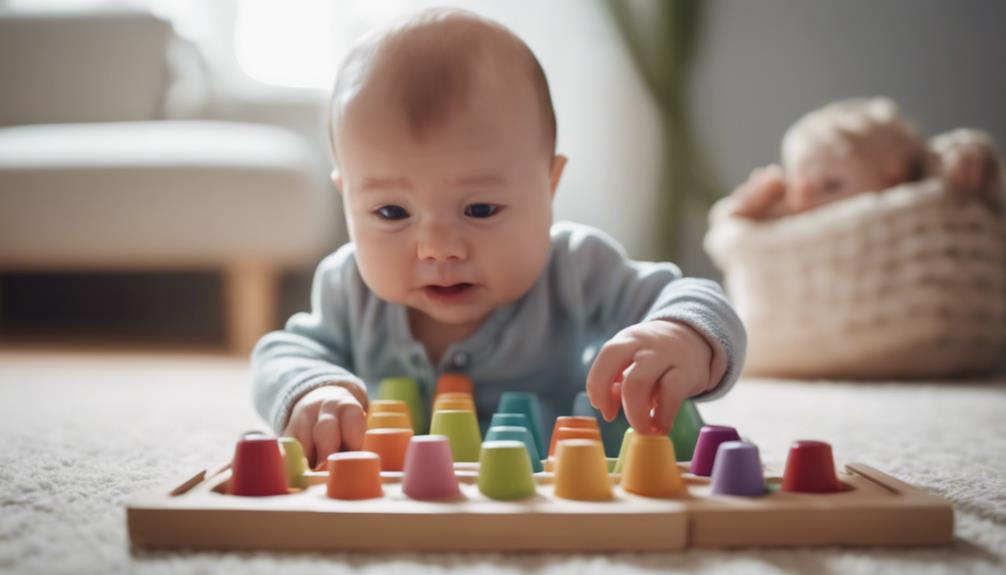
When evaluating intelligence in young children, a key aspect to ponder is their problem-solving abilities. Intelligent babies demonstrate advanced problem-solving skills, often mastering challenges quicker than their peers. Early problem-solving abilities in babies can be observed through their innovative approaches to overcoming obstacles. Encouraging and supporting a baby's problem-solving efforts can further enhance their cognitive development. Providing opportunities for babies to engage in problem-solving activities can help stimulate their intellectual growth. Intelligent babies display persistence in problem-solving and show a knack for finding creative solutions to challenges.
| Problem-Solving Abilities | |
|---|---|
| High Birth | Smart Baby |
| Problem-Solving Abilities | Advanced Problem-Solving Skills |
| Intellectual Abilities | Creative Solutions |
Emotional Sensitivity

Babies with emotional sensitivity may exhibit strong feelings and connections with others and pets. This trait often signifies mature thinking patterns and a need for encouragement in nurturing emotional intelligence.
Here are some key indicators of emotional sensitivity in babies:
- Intense Emotions: Emotional sensitivity can manifest as intense emotions, requiring caregivers to provide reassurance and comfort.
- Advanced Empathy: These babies may display advanced empathy towards others' emotions, showing a deep understanding of feelings.
- Emotional Support: Babies with emotional sensitivity might require additional emotional support and guidance to help them regulate their feelings effectively.
- Social and Emotional Development: By seeking opportunities to engage with emotionally sensitive babies, caregivers can foster their social and emotional development, helping them navigate relationships and emotions more effectively.
Understanding and supporting emotional sensitivity in babies is vital for their overall well-being and development.
Social and Emotional Intelligence

Socially and emotionally intelligent infants establish strong connections with people and pets early on, showcasing a deep understanding of emotions and mature thinking patterns. They engage in direct eye contact, forming powerful bonds with caregivers and peers. Babies with high emotional intelligence exhibit intense emotions, often requiring extra encouragement and support. These infants seek intellectual understanding and may initiate deeper conversations to express their feelings. By displaying a deep understanding of emotions, socially intelligent babies pave the way for successful relationships in the future.
| Social and Emotional Intelligence | Facts |
|---|---|
| Strong Connections | Infants form close bonds with people and pets early on |
| Direct Eye Contact | Babies engage in direct eye contact to connect emotionally |
| Deep Understanding | Babies showcase a profound understanding of emotions and mature thinking |
| Intense Emotions | Infants with high emotional intelligence exhibit strong emotions |
Frequently Asked Questions
How to Identify a High IQ Baby?
To identify a high IQ baby, watch for early alertness, quick face recognition, and hitting milestones early. Look for solitary play, intense focus, and a constant need for stimulation. Also, notice bigger birth weight and fast physical growth.
How to Tell if an Infant Is a Genius?
To tell if your infant is a genius, observe for advanced milestones, heightened curiosity, early language skills, and exceptional problem-solving abilities. Notice independence, strong emotional responses, and unique sleep patterns. Provide intellectual stimulation and nurture their potential.
How Do I Know if My Baby Is Gifted or Just Smart?
To know if your baby is gifted or just smart, observe their exceptional alertness, advanced skills, early language development, memory, curiosity, problem-solving abilities, and social/emotional growth. Seek guidance from professionals for accurate evaluation and support your child with stimulating activities and a nurturing environment.
Do Baby Milestones Indicate Intelligence?
Baby milestones, like early sitting or speaking in sentences, can indicate intelligence. Achieving developmental goals ahead of schedule, such as gestures or grasping objects, may suggest advanced cognitive abilities. Encourage communication skills for your baby to excel.
Conclusion
To sum up, while there are indicators that may suggest your baby is a genius, it's important to remember that every child develops at their own pace.
Like a budding flower, each little one has their unique journey of growth and learning.
Trust in the natural process of development and provide a nurturing environment filled with love, support, and opportunities for exploration.
Remember, a child's potential is limitless, regardless of any early signs of giftedness.

